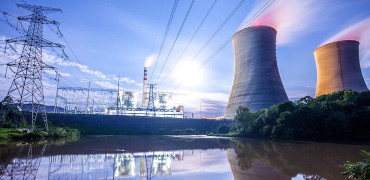The Autumn Statement is due to be delivered by the UK Chancellor almost on the eve of COP28.
Given the timing, Jim McClelland looks at what to expect from the budget and whether the proximity of the global climate summit will have any real bearing on policy.
A UK Chancellor only really has two red-briefcase dates to put in their work diary — one in Spring, the other in Autumn — when the spotlight is guaranteed to shine on them.
Each marks the day when they deliver a Budget or Statement to the House of Commons.
It is a very big deal.
This is their moment.
All eyes are on them.
A Nation awaits…
However, such moments do not take place in isolation. There is always a political context to consider.
In this particular case, when it comes to the green policy agenda, the UK Prime Minister has already most definitely set the tone; and not in a good way.
Finance will be a pivotal theme, intricately entwined with Climate Transition & Adaptation
A bonfire of green policies
In June this year, the Prime Minister Rishi Sunak had already committed to granting hundreds of new oil and gas licences for exploration and extraction in the North Sea.
Then last month, in the first real move of a pre-Election campaign, the PM poured gasoline on a pile of green policies, lit a match, and basked in the warmth of right-wing approval:
- He delayed the implementation date for banning sales of new petrol and diesel cars;
- pushed back the date for stopping oil and gas boilers being fitted into new-build homes;
- binned proposals for rental properties to have minimum EPC standards of ‘C’, or above;
- scrapped the Government’s Energy Efficiency Taskforce (EEFT); plus, most recently,
- talked of imposing restrictions on deployment of solar panels on farmland.
So, where does this incendiary assault on green issues leave an under-pressure Chancellor about to deliver his Autumn Statement, on the eve of COP28, in Dubai.
More damp squibs, few fireworks
Well, given that this is the same Jeremy Hunt MP who recently chose to travel by plane rather than train from Manchester to London, green expectations are frankly pretty low.
Furthermore, in the current economic climate, Government money is tight. There is very little to play with in terms of spending and investment. So, dangling carrots is difficult to do.
Things are also getting tactical. If a General Election were to be called for next Spring, it could be in Conservative Party interests to store up some fiscal goodies to offer the voters.
That is not to say there is no hope that the Chancellor might surprise us, sustainably.
This time last year, in the Autumn Statement 2022, he did announce new government funding worth £6bn for energy efficiency measures, but only to be made available from 2025 onwards. In the same breath, he also launched the short-lived EEFT, now defunct.
In this year’s Spring Budget, one of the few green headlines made by the Chancellor involved £20bn in funding promised in support of early development Carbon Capture Usage and Storage (CCUS), although this money is to be drip-fed over 20 years.
The Chancellor had also originally suggested that the UK Government would only fully respond to the groundbreaking US Inflation Reduction Act (IRA) around this time.
Signed into law in the back half of last year, the pioneering IRA boosted business confidence in the US clean energy sector, proving a magnet for international investment.
The chances of anything happening on that scale here, however, are zero. Hunt already took a sideswipe at the Biden flagship, counselling the UK to be ‘wary’ of new ‘subsidies’.
So, is there any likelihood that a looming COP28 might somehow carry some sway?
The current incumbents do not seem to care enough about climate action as a vote-winner
From Downing Street to Dubai
Well, the thematic programme for COP28 does forecast that Finance will emerge as a pivotal cross-cutting theme, intricately entwined with Climate Transition & Adaptation.
Plus, Sunak has now announced that he will actually attend the summit, which is reassuring, especially given the uncertainty over his participation last time.
The fact that there will be some high-level dialogue at COP28 around the role of nuclear in the energy transition will also play well with a UK Government that now controversially classes the technology as an 'environmentally sustainable’ option for power generation.
However, that is about as far as it goes for potential positives, for the UK.
Unlike Boris Johnson, Rishi Sunak is not naturally inclined to strut his stuff upon the world stage. He would probably never want to lead on any issue, even in the unlikely event that others invited him to do so; and on global climate policy, that day will never dawn.
Thanks to the damning resignation letter of Conservative Peer Zac Goldsmith, his peers already had a perception of him, both as a politician and a person, as someone “simply uninterested” in the environment. Now, given the recent litany of anti-green rhetoric outlined above, he even appears directly hostile to the climate agenda.
The reality is the current incumbents of Numbers 10 and 11 Downing Street just do not seem to care enough about climate action as a vote-winning issue. Pre-Election, it does not appear to resonate with them sufficiently to influence the pulling of fiscal policy levers in the Autumn Statement, or inspire them to align with shared ambitions at COP28.
Climate change is coming home
Ironically, though, there are actually millions of good reasons for them to care — all of which are to be found on their very own doorstep; and every one worth a Pound.
Using a digital twin of the Earth, a team of scientists at climate risk analytics provider Climate X has been able to predict how extreme weather events fuelled by the changing climate can impact properties, infrastructure or assets under different emissions scenarios.
What the findings show is that UK government assets across London, from 10 Downing Street to the Houses of Parliament, are already being impacted by climate change.
In fact, collective climate-related losses to these buildings are projected to reach £1.7M by 2030.
Now, surely that is a figure that should focus political minds and feature in any budget?
Jim McClelland is a sustainable futurist, editor, journalist and speaker




